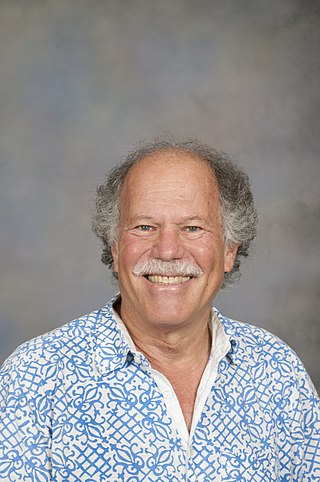
Shigellosis is an infection of the intestines caused by Shigella bacteria. Symptoms generally start one to two days after exposure and include diarrhea, fever, abdominal pain, and feeling the need to pass stools even when the bowels are empty. The diarrhea may be bloody. Symptoms typically last five to seven days and it may take several months before bowel habits return entirely to normal. Complications can include reactive arthritis, sepsis, seizures, and hemolytic uremic syndrome.
ATC code J07Vaccines is a therapeutic subgroup of the Anatomical Therapeutic Chemical Classification System, a system of alphanumeric codes developed by the World Health Organization (WHO) for the classification of drugs and other medical products. Subgroup J07 is part of the anatomical group J Antiinfectives for systemic use.

Gastroenteritis, also known as infectious diarrhea, is an inflammation of the gastrointestinal tract including the stomach and intestine. Symptoms may include diarrhea, vomiting, and abdominal pain. Fever, lack of energy, and dehydration may also occur. This typically lasts less than two weeks. Although it is not related to influenza, in the U.S. and U.K., it is sometimes called the "stomach flu".

ICDDR,B is an international health research organisation located in Dhaka, Bangladesh. Dedicated to saving lives through research and treatment, ICDDR,B addresses some of the most critical health concerns facing the world today, ranging from improving neonatal survival to HIV/AIDS. In collaboration with academic and research institutions over the world, ICDDR,B conducts research, training and extension activities, as well as programme-based activities, to develop and share knowledge for global lifesaving solutions.
The National Institute of Virology in Pune, India is an Indian virology research institute and part of the Indian Council of Medical Research (ICMR). It was previously known as 'Virus Research Centre' and was founded in collaboration with the Rockefeller Foundation. It has been designated as a WHO H5 reference laboratory for SE Asia region.
The rotavirus vaccine is a vaccine used to protect against rotavirus infections, which are the leading cause of severe diarrhea among young children. The vaccines prevent 15–34% of severe diarrhea in the developing world and 37–96% of the risk of death among young children due to severe diarrhea. Immunizing babies decreases rates of disease among older people and those who have not been immunized.

Mary Lou Clements-Mann was the founder and first Director of the Center for Immunization Research at the Johns Hopkins Bloomberg School of Public Health and is well known for her work in the areas of HIV and influenza vaccine research.
A vaccine-preventable disease is an infectious disease for which an effective preventive vaccine exists. If a person acquires a vaccine-preventable disease and dies from it, the death is considered a vaccine-preventable death.

Institut Pasteur Korea is an infectious disease-focused research institute located in Gyeonggi Province, Rep. of Korea. Its mission is to identify novel molecular targets and discover small molecules by utilizing its proprietary platforms to diagnose, treat and address serious unmet global public health needs.
Naval Medical Research Unit SOUTH, formerly known as Naval Medical Research Unit Six, is a biomedical research laboratory of the U.S. Navy located in Lima, Peru. It is the only U.S. military command located in South America. Its mission is to identify infectious disease threats of military and public health importance and to develop and evaluate interventions and products to mitigate those threats.
Firdausi Qadri is a Bangladeshi scientist with specialization in immunology and infectious disease research. She has worked over 25 years on the development of vaccines for cholera and has expertise on other infectious disease like ETEC, Typhoid, Helicobacter pylori, rotavirus, etc. Currently, she is working as a director for Centre for Vaccine Sciences of International Centre for Diarrhoeal Disease and Research, Bangladesh (ICDDR,B). She also serves as chairperson of the Institute for developing Science and Health initiatives. Her scientific achievements lie in enteric infections and vaccines including Vibrio cholerae and enterotoxigenic Escherichia coli—major causes of severe diarrhea. She has also focused on studying the immune response in Helicobacter pylori infected people in Bangladesh and the responses in patients with typhoid fever as well as vaccinees. The Government of Bangladesh awarded her the Independence Award in 2023.

Ira M. Longini is an American biostatistician and infectious disease epidemiologist.
Pasteur Institute of Iran is a medical research center located in Tehran, Iran. The institute is one of the oldest leading research and public health centers in Iran and the Middle East, established in 1920 following an agreement between the Institute Pasteur of Paris and the Iranian government. The Pasteur Institute of Iran was developed with the help of a land donation from Abdol-Hossein Farmanfarma. Its mission is to support advanced research and to provide innovative programs in basic and applied medical sciences, and production of biopharmaceuticals and diagnostic kits with special emphasis on infectious diseases. It meets the specialized and scientific health demands of the local community and tries to establish a link between applied research and industry. Pasteur Institute is a leading regional facility in the development and manufacture of vaccines. The institute has a total staff of 1300 in its 28 departments and 5 branches in different cities of Iran, which are active in different areas of medical and pharmaceutical biotechnology. There are about 300 PhDs and M.Sc. graduates.
Dengue vaccine is a vaccine used to prevent dengue fever in humans. Development of dengue vaccines began in the 1920s, but was hindered by the need to create immunity against all four dengue serotypes. As of 2023, there are two commercially available vaccines, sold under the brand names Dengvaxia and Qdenga.

Edward Thomas Ryan is an American microbiologist, immunologist, and physician at Harvard University and Massachusetts General Hospital. Ryan served as president of the American Society of Tropical Medicine and Hygiene from 2009 to 2010. Ryan is Professor of Immunology and Infectious Diseases at the Harvard T.H. Chan School of Public Health, Professor of Medicine at Harvard Medical School, and Director of Global Infectious Diseases at the Massachusetts General Hospital. Ryan's research and clinical focus has been on infectious diseases associated with residing in, immigrating from, or traveling through resource-limited areas. Ryan is a Fellow of the American Society of Microbiology, the American Society of Tropical Medicine and Hygiene, the American College of Physicians, and the Infectious Diseases Society of America.

The Institut Pasteur de Dalat is a vaccine research and production complex in Da Lat, Vietnam.

Vaccination in India includes the use of vaccines in Indian public health and the place of vaccines in Indian society, policy, and research.

Bharat Biotech International Limited (BBIL) is an Indian multinational biotechnology company based in Hyderabad, which is engaged in drug discovery, drug development, and the manufacture of vaccines, biotherapeutics, pharmaceuticals and healthcare products.

Scott Halstead is an American physician-scientist, virologist and epidemiologist known for his work in the fields of tropical medicine and vaccine development. He is considered one of the world's foremost authorities on viruses transmitted by mosquitoes, including Dengue, Japanese encephalitis, chikungunya and Zika. He was one of the first researchers to identify the phenomenon known as antibody-dependent enhancement (ADE), where the antibodies generated from a first dengue infection can sometimes worsen the symptoms from a second infection.

Inovio COVID-19 vaccine is a COVID-19 vaccine candidate developed by Inovio Pharmaceuticals.














